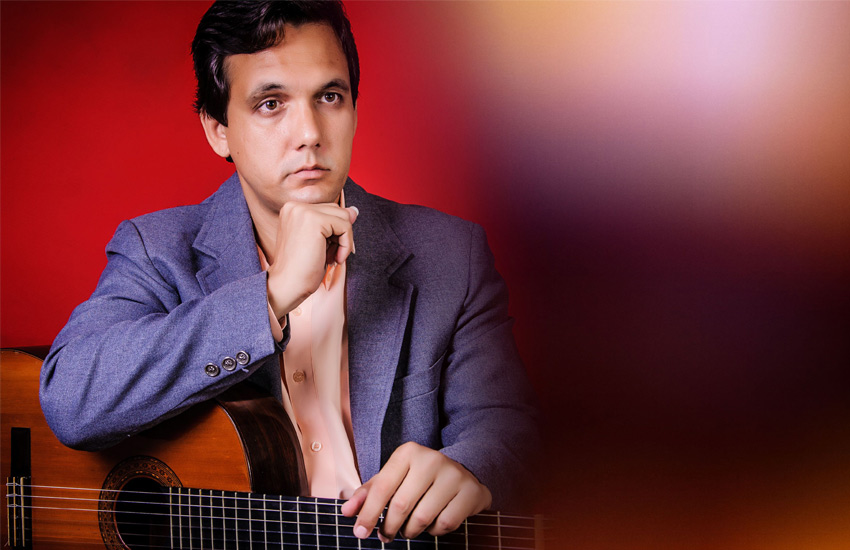
A chord changes you without knowing it, it moves your fibers, and it humanizes you. But if that chord is accompanied by a good soul, of those who cultivate the talent every day with the consecration of the great makers, it acquires greater meaning.
Las Tunas, Cuba.- Finding a man who for 25 years has devoted himself to the mastery of an instrument as friendly as the guitar, more than a job, becomes a delight.
Argibaldo Acebo Pérez, the one with the noble eyes and empathy on the surface, the life partner of Aleyvis Araúz (director of the professional choir Euterpe), the musician, the teacher, the father..., we talked to him this time.
"I grew up listening to classical music, which my father (Argibaldo) was fond of, and to songs from the Prodigious Decade, which my sister liked. That planted the seed."
However, it was the mother (Mirelia) who put in his hands the guitar that would change his life, so much so that it still accompanies him. "I always wanted to be a musician. For a year, I took lessons on that instrument with Bertica Maestre."
"Then, I enrolled in Percussion at El Cucalambé Vocational School of Art, but the assistant director of Music asked me if I would like to play the guitar, and even though she knew I was studying something else, she asked me to let her make a kind of club with me in that section... very clever of her, since that doesn't exist. I didn't even get to teach a percussion lesson."
The school, with its presentations inside and outside the institution, tested his aptitude. "My elementary teacher, Bárbara Milián Zayas, increased my interest in classical music, even though I had never known it before. In Music Appreciation classes, I realized that much of what they put in the auditions I had already heard, only then I taught who their composers were, their nationalities, characteristics and other aspects."
THE CHILD GREW UP
Upon graduating from that center, Argibaldo studied at the José White (Camagüey) and José María Ochoa (Holguín) professional music schools. He then entered the Higher Institute of Arts (Camagüey) and did a master's degree in Formative Processes in the Teaching of the Arts, among other activities.
"In 1994, I started, in unison, as a singer in Euterpe and a concert guitarist. In that calendar, during a cultural day, I played for the first time as a professional. One or two years later, my first concert arrived. It was beautiful."
He pauses in the conversation and strokes the guitar as if he were writing poems on its strings. He shakes off the memory and through his throat, like musical notes, comes the voice. "I have been marked by several composers, including Francisco Tárrega (Spain), Leo Brouwer (Cuba) and Heitor Villa-Lobos (Brazil)."
"When I present myself before an audience, I think that they are human beings, that they have a soul and that they are going to receive the best that I can offer them. Maybe there's a sick person in the audience and he or she will feel better with me."
He is considered an irremediable perfectionist in the assembly of works. This demand has outcomes in provincial and national concert days and in events such as the celebrations for the bicentennial of the Republic of Paraguay (2011) and the II International Guitar Orchestra Festival in Cali, Colombia (2017).
Very important in his life are his children Alejandro, Lilian and Gabriela. He is passionate about reading, especially books on philosophy and the Bible, and loves teaching at the now professional art school.
"I also owe my taste for pedagogy to Bárbara Milián; in her classes, I saw that she was happy to play the guitar and I wanted to transmit that to other people. I even teach younger students at school. I was also influenced by teachers Edel Aguiar and Félix Puig."
"I know that one has the mission to teach the technique as much as one can, but also of sowing love for 'the most beautiful form of the beauty' as a way of loving the one that's close to one... Although for me, as for Pythagoras, everyone who does his job well in a certain way makes music."
"People need concert music. It is not so cryptic that they do not understand it, or at least understand it from feeling and emotion. Recently a spice salesman stopped me on the street and said: 'Professor, I went to one of your concerts and enjoyed it.”
And the man returns home. I imagine him there, under the tiles and leaks of a hundred-year-old house, with the dim lights he prefers and an old cup full of coffee. Meanwhile, the guitar awaits the next arpeggios.





